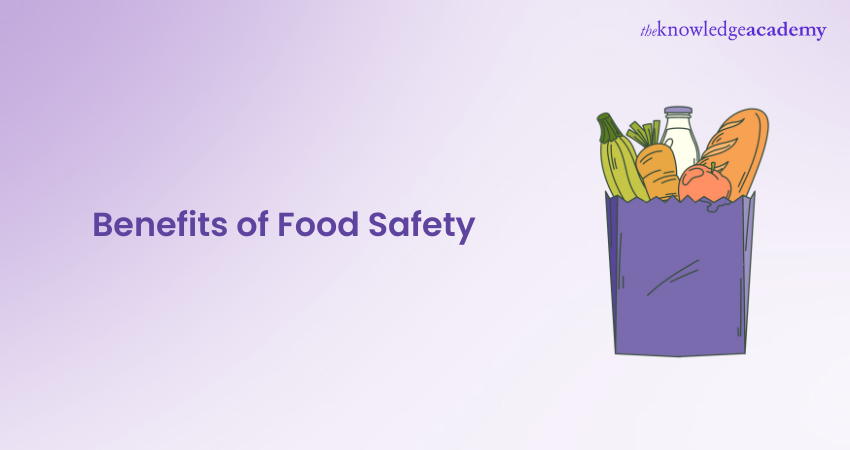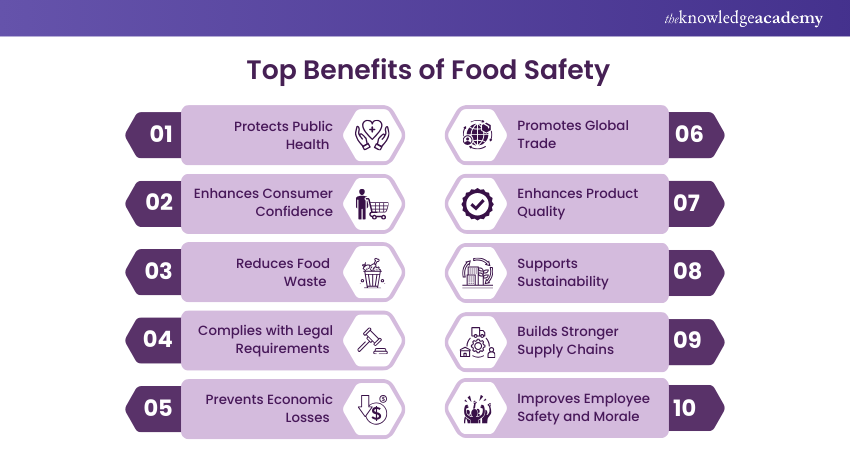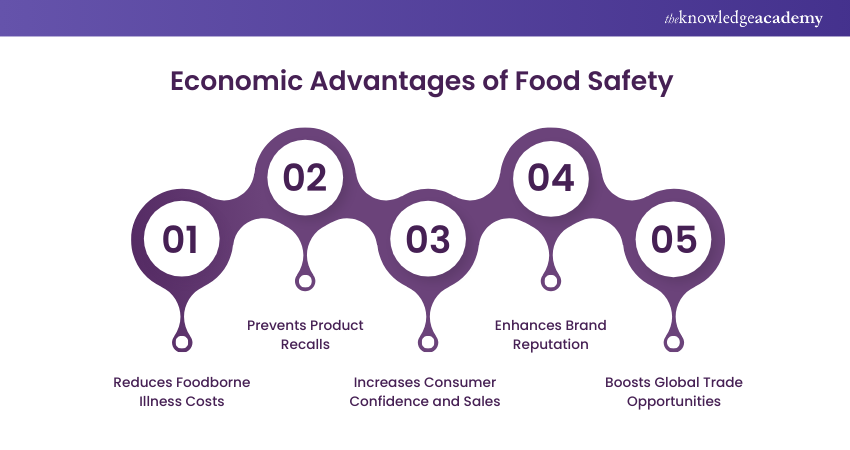We may not have the course you’re looking for. If you enquire or give us a call on +44 1344 203 999 and speak to our training experts, we may still be able to help with your training requirements.
Training Outcomes Within Your Budget!
We ensure quality, budget-alignment, and timely delivery by our expert instructors.

Ensuring Food Safety is crucial for both public health and economic growth. According to World Health Organisation (WHO), children under five years old carry 40% of the foodborne disease burden, causing 125,000 deaths each year. This statistic highlights the urgent need for strict Food Safety practices. The Benefits of Food Safety extend beyond preventing illnesses; they also reduce costs and open up global trade opportunities. In this blog, we DISCUSS the economic advantages of Food Safety and how it contributes to a healthier, more prosperous society.
Table of Contents
1) Top Benefits of Food Safety
a) Protects Public Health
b) Enhances Consumer Confidence
c) Reduces Food Waste
d) Complies with Legal Requirements
e) Prevents Economic Losses
2) Economic Advantages of Food Safety
3) Conclusion
Top Benefits of Food Safety
Here are the top benefits of maintaining high Food Safety standards.

1) Protects Public Health
Food Safety practices help prevent foodborne illnesses and contamination. By ensuring that food is handled, prepared, and stored correctly, we reduce the risk of bacteria, viruses, and other pathogens causing illness.
This protects consumers from potentially severe health issues. Ultimately, maintaining high Food Safety standards helps keep the public healthy and safe.
2) Enhances Consumer Confidence
When Food Safety standards are consistently met, consumers feel confident in the products they purchase. This trust results in increased customer loyalty and a stronger reputation for food producers and retailers.
Knowing that their food is safe and high-quality encourages consumers to keep buying from trusted sources. Enhanced consumer confidence can drive business growth and success.
3) Reduces Food Waste
Proper Food Safety practices help to reduce food waste by ensuring that food remains safe and consumable for longer periods. By following correct storage, handling, and preparation guidelines, food spoilage is minimised.
This not only saves money for consumers and businesses but also has positive environmental impacts. Reducing food waste contributes to a sustainable food system.
4) Complies with Legal Requirements
Adhering to Food Safety regulations ensures that businesses comply with local, national, and international laws. Compliance helps avoid legal issues, fines, and shutdowns that can result from violating Food Safety standards.
Staying updated with Food Safety laws is crucial for maintaining a business's operational integrity. It also shows a commitment to public health and safety.
5) Prevents Economic Losses
Foodborne illnesses and contamination can lead to significant economic losses for businesses due to product recalls, lawsuits, and loss of reputation. By implementing strict food safety measures, businesses can avoid these costly issues.
Ensuring Food Safety can lead to better financial stability and profitability. Preventing economic losses through Food Safety is essential for long-term business success.
6) Promotes Global Trade
High Food Safety standards are essential for engaging in global trade. Countries and international markets require strict adherence to Food Safety regulations to ensure the quality of imported and exported goods.
Meeting these standards opens up opportunities for businesses to expand into new markets. Promoting global trade through Food Safety can lead to economic growth and development.
7) Enhances Product Quality
Maintaining Food Safety standards helps to ensure that food products are of high quality. This includes maintaining the right temperature, proper hygiene practices, and avoiding contamination.
High-quality products meet consumer expectations and lead to increased satisfaction. Better product quality can distinguish a brand in a competitive market.
8) Supports Sustainability
Implementing Food Safety practices supports sustainability efforts by minimising waste and promoting efficient use of resources. Proper handling and storage reduce spoilage and ensure that more food reaches consumers in good condition.
Sustainable practices in Food Safety contribute to the overall well-being of the environment. This aligns with global efforts to foster sustainability in all industries.
9) Builds Stronger Supply Chains
Strong Food Safety practices create more reliable and resilient supply chains. When all parts of the supply chain adhere to safety standards, the risk of contamination and foodborne illness decreases.
This reliability ensures that consumers receive safe products consistently. Building stronger supply chains through Food Safety is crucial for maintaining market stability.
10) Improves Employee Safety and Morale
Ensuring Food Safety also protects employees who handle, prepare, and serve food. Safe working environments reduce the risk of accidents and illness, leading to better overall employee health.
Employees who work in safe conditions are likely to have higher morale and productivity. Improving employee safety and morale through Food Safety practices benefits both the workers and the business.
Learn how to ensure the correct design of food establishment premises with our Food Safety Manager Training – Join today!
Economic Advantages of Food Safety
Maintaining Food Safety standards offers numerous economic benefits for businesses and consumers alike. Here are the key advantages that contribute to economic growth and stability.

a) Reduces Foodborne Illness Costs: Implementing Food Safety measures helps reduce the incidence of foodborne illnesses. This decreases medical costs, lost productivity, and legal expenses associated with treating and managing these illnesses.
b) Prevents Product Recalls: Strict Food Safety standards help prevent contamination, and other issues that can lead to product recalls. Recalls are expensive and can damage a company's reputation.
c) Increases Consumer Confidence and Sales: When consumers trust that their food is safe, they are more likely to buy from those brands. This increased confidence can lead to higher sales and repeat customers.
d) Enhances Brand Reputation: Companies that consistently meet Food Safety standards build a strong reputation for reliability and quality. A good reputation attracts more customers and can lead to better business opportunities.
e) Boosts Global Trade Opportunities: High Food Safety standards are essential for accessing international markets. Countries with stringent Food Safety regulations only import from suppliers who meet these standards. By adhering to global Food Safety requirements, businesses can increase their export potential.
Learn food preservation techniques with our Food Hygiene and Safety in Manufacturing Training – Join today!
Conclusion
The Benefits of Food Safety extend beyond just health protection—they also offer significant economic advantages. By reducing illness costs and preventing product recalls, businesses can thrive. Ensuring Food Safety is essential for long-term success and sustainability in the food industry. These benefits highlight the importance of prioritising Food Safety in every aspect of food production and handling.
Learn ways to prevent cross-contamination in food with our Food Safety and Hygiene Course – Join now!
Frequently Asked Questions

Food Safety ensures that products are safe for consumption, which builds consumer trust. When customers know a business prioritises safety, they are more likely to become loyal patrons. A strong reputation for Food Safety can lead to positive word-of-mouth and increased business.

Food Safety practices help maintain the freshness and quality of food by preventing contamination. Proper handling, storage, and preparation methods extend the shelf-life of products. This results in less spoilage, saving money and ensuring customers receive high-quality food.

The Knowledge Academy takes global learning to new heights, offering over 30,000 online courses across 490+ locations in 220 countries. This expansive reach ensures accessibility and convenience for learners worldwide.
Alongside our diverse Online Course Catalogue, encompassing 17 major categories, we go the extra mile by providing a plethora of free educational Online Resources like News updates, Blogs, videos, webinars, and interview questions. Tailoring learning experiences further, professionals can maximise value with customisable Course Bundles of TKA.

The Knowledge Academy’s Knowledge Pass, a prepaid voucher, adds another layer of flexibility, allowing course bookings over a 12-month period. Join us on a journey where education knows no bounds.

The Knowledge Academy offers various Food Hygiene and Safety Training, including the Food Safety and Hygiene Course, Food Hygiene and Safety in Manufacturing Training, and Food Safety Manager Training. These courses cater to different skill levels, providing comprehensive insights into Food Safety.
Our Health & Safety Blogs cover a range of topics related to Food Safety, offering valuable resources, best practices, and industry insights. Whether you are a beginner or looking to advance your Health & Safety knowledge, The Knowledge Academy's diverse courses and informative blogs have got you covered.
Upcoming Health & Safety Resources Batches & Dates
Date
 Food Safety and Hygiene Course
Food Safety and Hygiene Course
Fri 3rd Jan 2025
Fri 7th Mar 2025
Fri 2nd May 2025
Fri 4th Jul 2025
Fri 5th Sep 2025
Fri 7th Nov 2025







 Top Rated Course
Top Rated Course



 If you wish to make any changes to your course, please
If you wish to make any changes to your course, please


